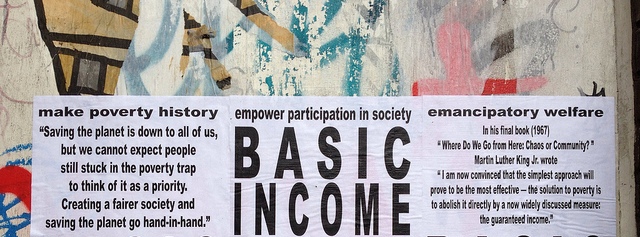We at Research & Degrowth are repeatedly being told that our framing won't work. That we are preaching to the choir by the way we frame our proposals, and that we will never convince the broader public. So, here are our policy proposals re-framed in the language of the U.S. elections.
Abolish all income tax on incomes lower than $50,000 dollars per year. Finance this tax break by establishing a sovereign carbon fund financed by charges to the oil, coal and natural gas industry and by a carbon fee on trade imports.
Make Friday a day off that we can dedicate to our families, friends and communities. Do not reduce salaries: same pay for four days of work. President Roosevelt did it during the Great Depression. This alone can create 10 million new jobs.
No bank should lend more than its deposits. Banks cannot be allowed to create money out of thin air, while all the rest of us have to work hard just to get by.
Each and everyone should have the freedom to choose how to live their lives free from illness, hunger or fear. Establish a permanent freedom income of $800 per month, for every American. Pay for the income like Alaska did with a sovereign carbon fund. If this is not enough, finance it with a sovereign capital fund, funded by a progressive fee on excessive capital.
Hard-working Americans should have the right to inhabit housing assets that are left unused for more than one year for the purpose of speculation.
On the Need for Collaboration Between Social Movements and Activisms By Lucie Bardos Not that long ago, I left North America and arrived fresh and starry-eyed in Lund, Sweden, ready to begin my master’s degree in a program entitled Culture, Power and Sustainability. In my second year, I decided to write my thesis about the Transition Town movement, a social movement out of Great Britain born ...

Von Ronald Blaschke Um es gleich vorweg zu sagen: Es gibt nicht „die“ Grundeinkommensbewegung, wie es auch nicht „das“ Grundeinkommenskonzept gibt.[1] Es gibt auch nicht „die“ Degrowth-Bewegung wie es auch nicht „das“ Degrowth-Konzept gibt. Aber es gibt in beiden Bewegungen übereinstimmende bzw. ähnliche Ansätze, die fruchtbar für ein gemeinsames politisches Engagement gemacht werden können.[2...
Die nächste Internationale Degrowth Konferenz für ökologische Nachhaltigkeit und soziale Gerechtigkeit startet am 30.August 2016 in Budapest. Wer aktiv bei der Konfernez dabei sein will kann jetzt dem "Call for Special Sessions" folgen oder einem der anderen Calls die noch kommen werden. Es gibt zwei Special Session Formate, ein wissenschaftliches und ein praktisch-aktivistisches. Im Januar kö...